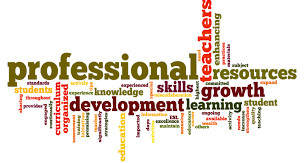Professional development is an integral part of any career. One must always have a growth mindset that encourages us to be curious and explore new knowledge or techniques. “Professional development describes programs that enable educators to improve their own teaching — both by learning new teaching tyles, tips and techniques, as well as subject areas; and by interacting with expert instructors and experienced educators in the program of their choice.” (University of San Diego, 2024). However, the time needed for professional growth always conflicts with the everyday tasks of the job. I myself am guilty of being in the middle of a presentation and silently wishing I could be doing something that needs to be done rather than listening to the presentation. The presentation may be helpful, but it may also mean that my family time at home on the weekend will be compromised because I didn’t finish a task that needed to be done that week. I always keep this in mind when I have learning that I feel would be helpful for our staff.
Professional development needs are different for every teacher. It’s important to make everyone aware of your services and give them choices in what may be the most beneficial for them. The goal is to improve student outcomes; therefore, “it is important for educational leaders to provide access to high-quality professional development that offers a timely response to individual needs. Each learning opportunity should demand thoughtful consideration to ensure it is the most appropriate option to support teacher growth.” (Frontline Education, 2024). Some ways to gather information on what is needed are to create a Google form, request feedback from grade levels on what is most pertinent to them, or to align presentations with the school's educational goals. Teachers need to see how this will impact their teaching in the short and long term to be engaged in what you are presenting.
Building strong relationships with your teachers is an integral part of providing meaningful professional development. Just as you adapt your teaching for certain students, it is also important to know what may or may not work for your teachers. It’s important that they see you as a trusted professional who will be there to help guide them through the process whenever needed without judgment. This is especially important for those new teachers who may be struggling to meet all the perceived demands of the job. For that reason, I’ve always appreciated professional development that provided me with slides, support documents, or videos to refer back to when I have an issue or need a quick refresher. I also think it’s important to collaborate to create lessons that teachers can use with their classes. This is often where I personally get stuck. While I might see the value in what I have learned, the time to change what I have been doing to something else will probably require me to do it on my own time.
Finally, professional development should be simple and direct, be ongoing, and offer opportunities for feedback and discussion. We should commit to allowing the proper time for the information we have presented to be mastered. Too often, we present something one time and don’t allow our teachers the time needed to digest and implement the learning with our continued support. We as librarians need time to listen to feedback and self-reflect on what we liked about the presentation and what we would present differently next time. It’s also important to suggest where they may find further information, such as blogs, webinars, books, social media, or academic courses.
As colleagues, continued collaboration will no doubt benefit our students but also ourselves. It feels good to have others to rely on when we need them. Being part of something that has improved our students' learning experience can be very rewarding, and no doubt, it is our goal each and every day.
Works Consulted
10 strategies for effective teacher professional development (with examples). University of San Diego - Professional & Continuing Education. (2024). https://pce.sandiego.edu/10-strategies-for-effective-teacher-professional-development-with-examples/
5 ways to make teacher professional development effective (& 7 powerful resources). prodigygame.com. (2023, June 15). https://www.prodigygame.com/main-en/blog/teacher-professional-development/
Cox, J. (2019). Professional Development Graphic. 15 Professional Development Skills for Modern Teachers. Retrieved from https://www.teachhub.com/professional-development/2019/11/15-professional-development-skills-for-modern-teachers/.
Effective professional learning strategies (that actually work). Frontline Education. (2024, May 15). https://www.frontlineeducation.com/professional-learning/
Teacher Professional Development Discussion. (2019). https://neeadvantage.com/blog/teacher-professional-development-3-activity-ideas-for-school-leaders/. Retrieved June 2024, from https://neeadvantage.com/blog/teacher-professional-development-3-activity-ideas-for-school-leaders/.



You raise excellent points in your post. I agree that sending out Google forms is an efficient way to gather information from staff about what types of services and supports would best benefit them and their classes. I also like that you speak to the importance of ongoing, reflective professional development. I too have been to seminars that I have enjoyed but promptly set aside, because there wasn't an opportunity to try out the new teachings, nor was there time to debrief. You recommend giving time for mastery of pro-d offerings, and I think this would greatly benefit teachers learning from their TLs.
ReplyDeleteHi Angela,
ReplyDeleteYou make such a great point here and one we seldom focus on in education... business tackles this a little more. You mention making, "everyone aware of your services and give them choices in what may be the most beneficial for them". What an amazing concept, wouldn't all workplaces benefit from understanding each others areas of strength and weakness? By focusing on what we are good at we thrive ourselves and help those around us. Although we do this we students in the classroom, I wish we did more with the adults working in education :)
The following quote from your post resonates with me - “We as librarians need time to listen to feedback and self-reflect on what we liked about the presentation and what we would present differently next time.” I feel this is a key aspect of leading effective professional development. I also agree with your thoughts about needing time after a session to action what you have learned.
ReplyDelete